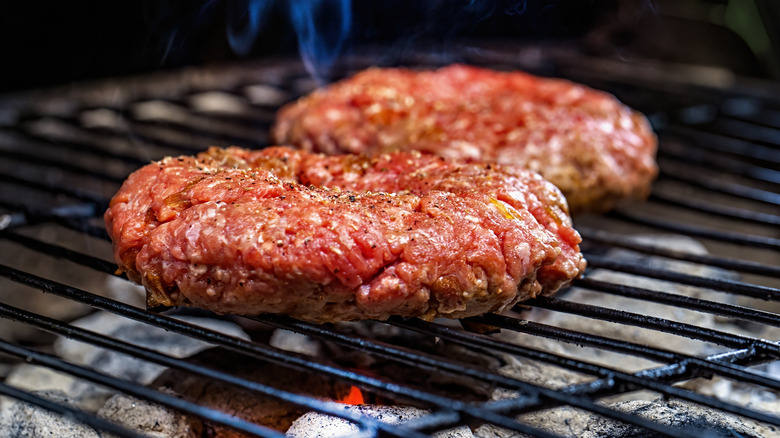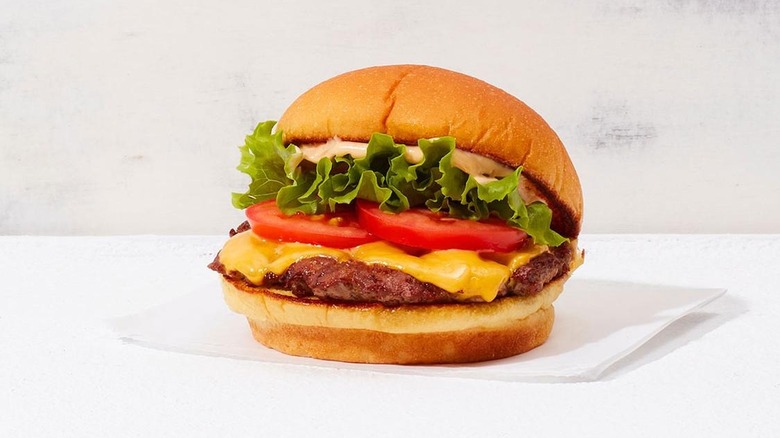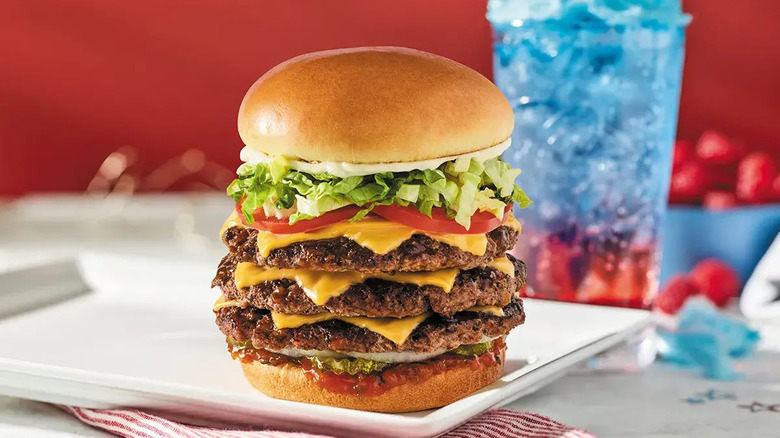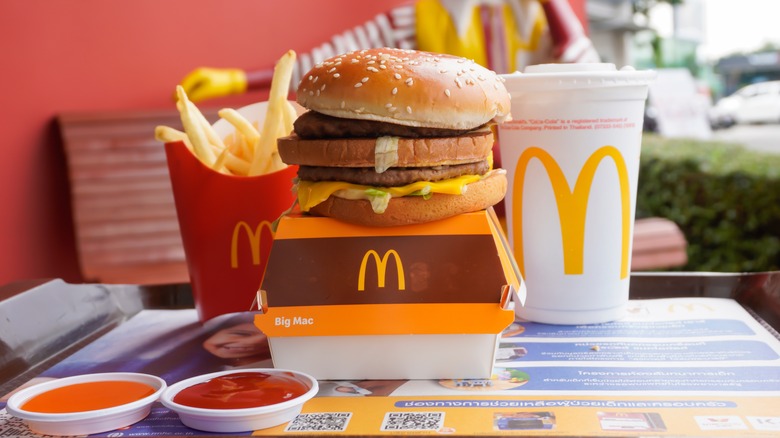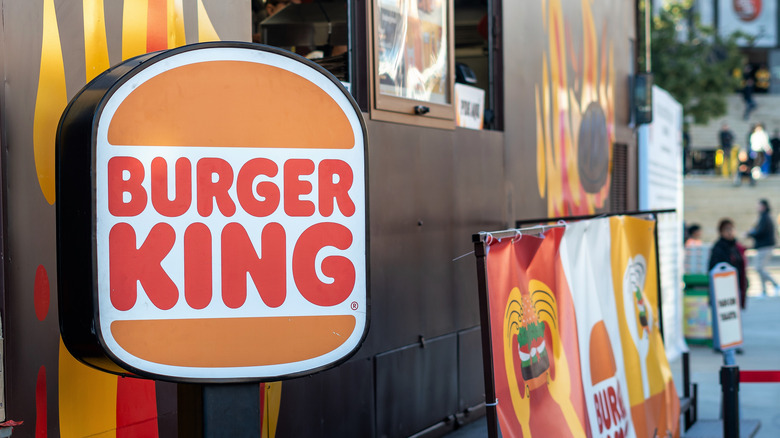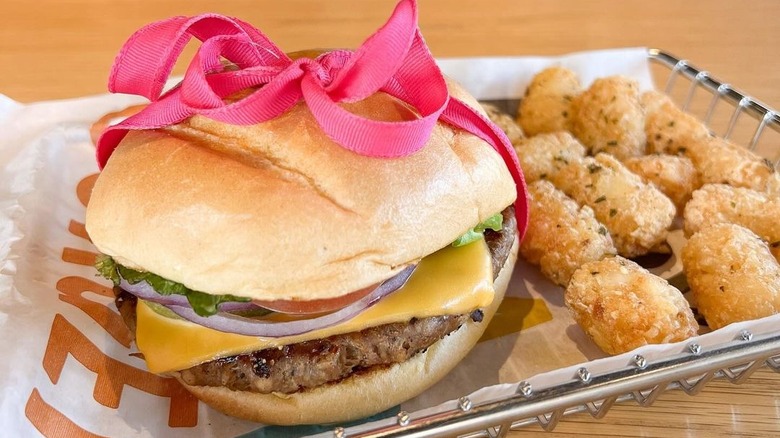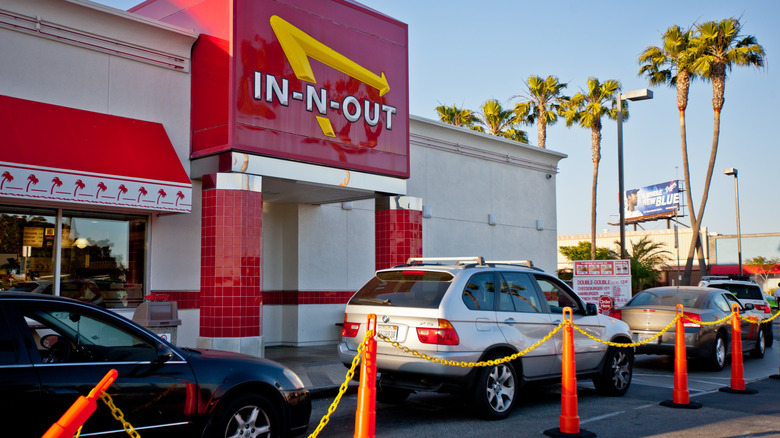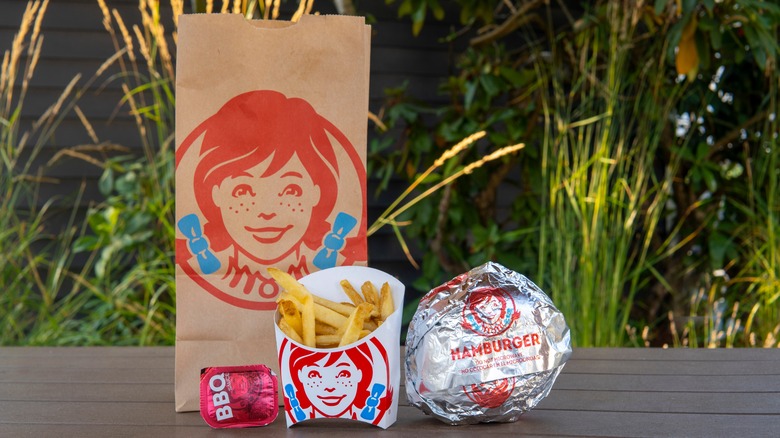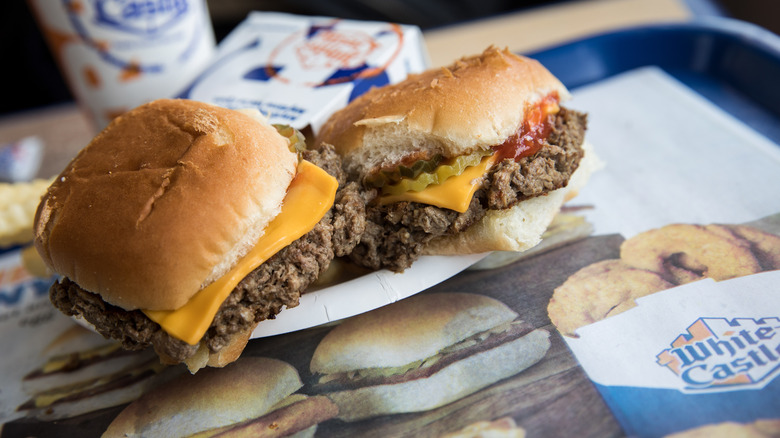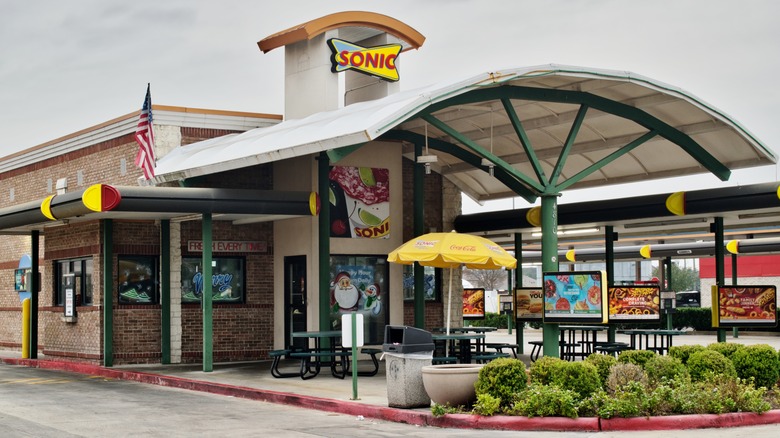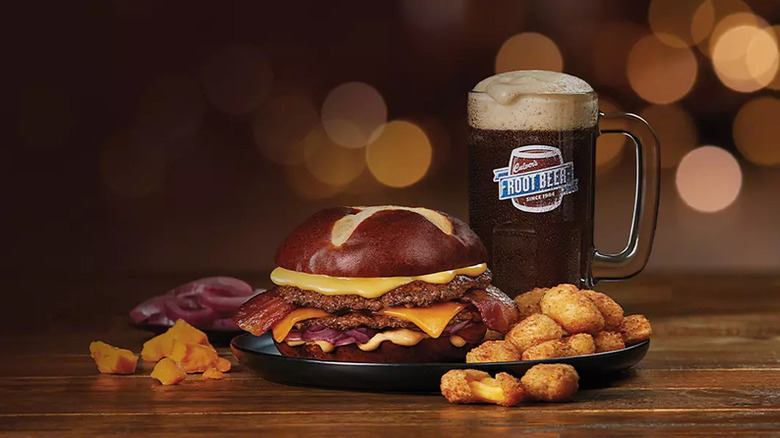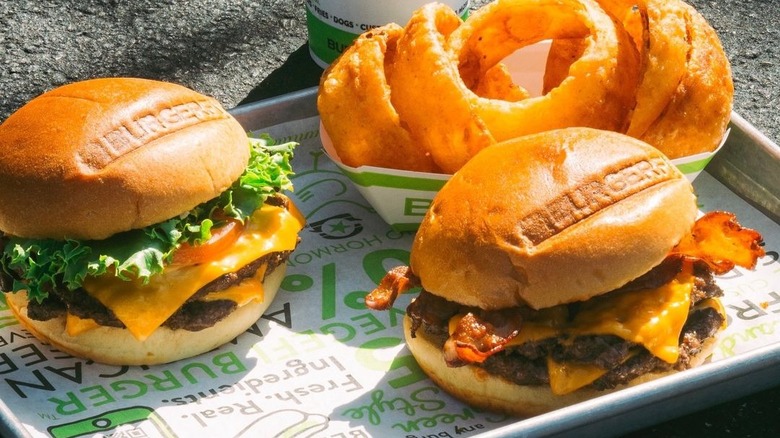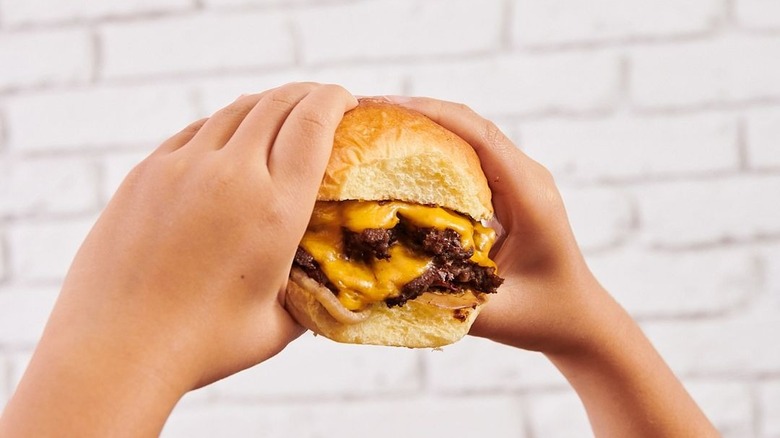Never Buy A Burger From These Chains If You Want Organic Beef
To be labeled organic in the U.S., beef must meet the USDA's very specific organic certification standards for sustainable and humane farming practices. Specifically, organic beef must come from cattle that are raised without antibiotics or growth hormones. These animals are fed organic feed, which means their diet is free from synthetic pesticides and fertilizers, and they must have access to outdoor grazing to support their natural behaviors and promote their well-being. Given these tough requirements, it's no surprise that many popular burger chains don't go out of their way to put organic beef in their burgers.
Of course, using organic beef can be pretty expensive, which explains why most burger chains opt out. They're going for budget-friendly over quality, we get it. But a lot of these burger chains have crossed the line in just how low-quality their beef is. Over the past six years, Consumer Reports and the Natural Resources Defense Council (NRDC) have teamed up to keep an eye on the quality of beef used by major fast food and fast-casual chains. They put together a report called Chain Reaction that grades these chains based on how they handle antibiotics in their beef supply. The 2021 report showed that a lot of well-known chains still aren't living up to quality beef standards of any kind, let alone being organic. Looking at this report and beyond, let's dive into some of the most popular burger chains that don't use organic beef.
Shake Shack
Shake Shack prides itself on using high-quality ingredients, and its beef is no exception. The restaurant serves 100% all-natural Angus beef that is free from added hormones and antibiotics, a significant step towards more responsible sourcing. Its special Shack blend, freshly ground from this Angus beef, is a standout feature of the menu, making for a juicy and delicious burger every time. On top of that, Shake Shack serves its burgers on non-GMO potato buns, showing the company's commitment to keeping things as natural as possible.
However, while Shake Shack's beef is natural and free from certain additives, it does not meet USDA-certified organic standards. This means that despite avoiding growth hormones and antibiotics, the beef isn't certified organic. It may still come from cattle raised with conventional practices that don't align with organic guidelines. So, while its quality of beef is far from the worst, those seeking a burger that is USDA-certified organic should steer clear of Shake Shack.
Red Robin
Red Robin is well-known for its gourmet burgers, and it serves up some tasty and interesting options with all-natural, 100% USDA-inspected beef sourced from the U.S. You'll be happy to know that the beef is free of preservatives and artificial ingredients, a big plus for anyone committed to eating high-quality meat. The emphasis on natural ingredients no doubt helps make Red Robin's burgers as juicy and flavorful as they are, staying true to its reputation for excellence in the burger category.
That being said, while the beef is all-natural and free from artificial additives, it's not certified organic. It doesn't use preservatives and artificial ingredients, but it still doesn't meet USDA organic standards. What does that mean exactly? The beef could potentially come from cattle raised on growth hormones and antibiotics, or be fed the standard feed that doesn't meet rigid organic criteria. If USDA-certified organic beef is a must for you, Red Robin's burgers don't quite fit the bill, even though they do excel in gourmet flavor.
McDonald's
People often joke about what's really in McDonald's beef, but the truth is the company is pretty transparent about it. All of McDonald's burger patties in its U.S. locations use 100% USDA-inspected beef — no other types of meat are involved. Plus, its burgers are free from fillers and preservatives, which is another step toward better quality. Despite all that, McDonald's beef isn't certified organic, which comes as a surprise to practically no one, if we're being honest. Despite the quality checks and lack of artificial ingredients, the beef doesn't meet the standards for organic farming, where things like hormone and antibiotic use are not allowed.
Adding to the concerns, McDonald's got a C grade in the Chain Reaction 2021 report. This grade tells us right off the bat that its beef is still frequently treated with antibiotics. Is this a dealbreaker for everyone? It doesn't seem like it, because in the end, who goes to McDonald's expecting the epitome of health? The mouth-watering taste is what keeps customers coming back for more. But if you're set on avoiding antibiotics and sticking with organic options, you should definitely consider going somewhere other than the golden arches for a burger.
Burger King
When it comes to Burger King, most people don't go there thinking about organic beef — it's more focused on the fast, addictively flavorful experience. Despite all that, Burger King's beef patties are in fact made from 100% beef and completely free of additives, preservatives, and fillers. This is probably better than you might expect from a fast-food conglomerate, which is good for something, right? Yet that's not the whole story. Burger King is proud to keep certain less-desirable ingredients out of its menu items, but its beef isn't labeled as either USDA-inspected or organic. Yikes.
And it gets worse. Burger King scored an F on the 2021 Chain Reaction report, which goes to show there are some real issues with its beef supply. This low grade is essentially proof that the beef it uses in its burgers is still frequently treated with antibiotics, which is not good for the cow or the person eating the beef.
Smashburger
Smashburger, founded in 2007, is still pretty much a newcomer as far as popular burger chains go. The restaurant made a name for itself and moved up the ranks quickly with its unique approach to burger-making and dedication to healthier ingredients. Smashburger sources its beef from family-owned farms in the U.S., which are known for their humane, climate-friendly, and sustainable practices. This, plus its unique approach to burger prep — fresh, never-frozen smashed beef seared on a hot grill — has helped set the restaurant apart from others in the burger arena. It's a signature move that creates a deliciously crispy crust while keeping the burger as juicy and tasty as ever.
This focus on great ingredients and better farming practices may be impressive, but it's worth noting that the beef isn't certified organic. This just goes to show how tough it can be to earn the USDA organic label, from specific feed requirements to detailed farming practices. Even without the organic certification, Smashburger remains a solid choice for those seeking a really tasty burger that isn't quite so bad for you. It's a testament to the fact that even burger chains can both do better by customers with better ingredients and remain profitable. Without a doubt, Smashburger is a great alternative to many of the other burger chains around, even if its burgers aren't quite organic.
In-N-Out Burger
In-N-Out Burger is a beloved chain that has amassed a rather large cult following over the past few decades, and it's not all that hard to see why. People can't get enough of the no-nonsense menu, the yum factor of the burgers, and the fun of the secret menu items that can make any visit feel like you're part of an elite club. Part of what makes the beef taste as good as it does is In-N-Out's use of individually inspected, whole beef chuck from premium cattle, and it's all meat — no bones or fillers here.
But is the beef in the burgers organic? Absolutely not. Beef has to pass really strict standards to earn the USDA-certified organic label, and like most of the burger chains out there, In-N-Out has not decided to invest in that level of quality. Still, die-hard In-N-Out fans don't seem to be asking for a beef upgrade. For the majority of people, the combination of good-enough ingredients, unbeatable taste, and the iconic experience far outweighs the need for an organic label.
Wendy's
Wendy's has made some waves in the fast-food universe with what it calls "Progressive Beef." It's called "progressive" because the beef is never-frozen and comes from farms treating cattle humanely and using antibiotics responsibly, all while keeping an eye on environmental sustainability. This focus on better practices definitely shows a growing commitment to healthier menu options for its customers. But here's the thing: even with these progressive steps, Wendy's beef isn't certified organic, not even close.
In the 2021 Chain Reaction report, Wendy's scored a C, which is not a great score by any means. However, this is at least an improvement from the previous year's D+. It's a sign that Wendy's is making some progress, though there's still room for going even further. The company has set a goal to ensure that by 2030, all of its beef, pork, and chicken will come from suppliers that don't routinely use antibiotics. While it's not hitting the organic mark just yet, Wendy's commitment to improving its beef policy shows it's heading in a positive direction.
White Castle
White Castle has been a staple in the fast-food world since the 1920s, known for its iconic square sliders that have earned a special place in pop culture. This is thanks in part to classic movies like "Harold & Kumar Go to White Castle," where a simple trip to get some burgers turned into a crazy adventure. If you've ever craved those tiny burgers with a side of nostalgia, you're not alone. In terms of quality, White Castle is not the worst. It uses 100% USDA beef for its patties, so at least you know you're getting pure meat without any fillers. Yet pure beef does not translate to organic, and that's a label White Castle can't claim whatsoever.
Organic beef is obviously a healthier choice, as the cattle aren't treated with antibiotics or hormones, among other things. This means you're not getting exposed to these substances, which can be a concern since antibiotics in meat might lead to resistance in our own bodies. But hey, it's probably not a huge shock that White Castle isn't serving up organic beef sliders. The brand is much more about quick, cheap burgers than being the gold standard of health. If you're looking for that caliber of burger, you're going to have to find it somewhere else.
Sonic
Since opening its doors in 1953, Sonic has been all about that classic drive-in experience — think roller-skating servers and a menu overflowing with indulgent treats. From its famous chili cheese fries to its inventive slushes, Sonic has built a loyal fan base who love the retro charm and variety. When it comes to the beef in its burgers, Sonic does use 100% pure beef patties. However, what good is pure beef if the beef isn't all that good? In the case of Sonic, you won't find high-quality, certified organic beef, that's for sure. Sonic's beef is worse than just isn't not-organic though. It also scored an F on the 2021 Chain Reaction report.
This failing grade makes it clear that Sonic is far from putting effort into real quality or consumer health. So, if you're hoping for an organic burger, or even a burger that scores above a failing grade on serious quality reports, Sonic is absolutely not where you should be going.
Culver's
Culver's, founded in 1984 by Craig and Lea Culver, is a beloved midwestern burger chain known for its signature ButterBurgers and creamy frozen custard. The ButterBurger, featuring a fresh, never-frozen beef patty on a lightly buttered, toasted bun, is a standout menu item that keeps customers coming back. It seems that small addition of butter goes a long way to help Culver's stand out in the crowd of fast-food burgers.
However, while Culver's takes pride in serving fresh, high-quality beef, we should note that the beef in its burgers isn't organic. The burgers are made of 100% beef though, which should still count for something, even if they don't meet the USDA's strict organic standards. To be fair, judging by the fact that Fodor's ranked Culver's as America's top fast-food chain in 2024, it's clear that the chain's dedication to fresh, flavorful food and impeccable customer service is resonating with customers, organic or not.
BurgerFi
BurgerFi, a rapidly growing U.S. burger chain founded in 2011, only uses A-grade Angus beef in its burgers, setting itself apart from many of the other popular burger chains. The restaurant also employs what it calls the "Never-Ever program," where the beef it uses is free-range, raised vegetarian, and treated humanely, with zero steroid, antibiotic, or growth hormone exposure. BurgerFi's suppliers raise cattle that roam free and are fed natural products or grass for the majority of their lives. That's a high-quality beef product right there.
Despite all these high standards, BurgerFi's beef still doesn't come with a USDA-certified organic label. But honestly, with the quality and care that goes into its meat, this might be as close as it gets to organic for a burger chain. It's nice to know that BurgerFi is serious about doing things right, setting a high bar for both flavor and ethical practices. Now if we could only get some of the other burger chains to follow suit, that would be the dream.
Mooyah
Mooyah, a standout in the burger scene, is known for its commitment to using 100% Certified Angus Beef. This beef isn't just any cut — it meets rigorous standards that surpass those for USDA Prime, Select, and Choice. For this reason, Mooyah confidently tells the world that the beef in its burgers is of a higher caliber than most steaks. Those are some big shoes for burgers to fill. Finding this kind of dedication to quality in the vast landscape of burger chains isn't common. Many fast-food spots opt for lower-grade beef to keep prices down, but Mooyah's approach is refreshingly different.
Yet even with this impressive standard, the beef Mooyah uses in its burgers isn't organic, meaning those grade-A Angus cows might still be treated with hormones and antibiotics. But should you let that steer you away? Probably not. After all, Mooyah's beef might not come with an organic label, but it's for sure a cut above most of the other burger chains out there.
